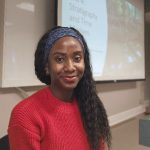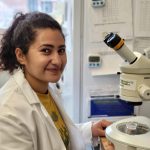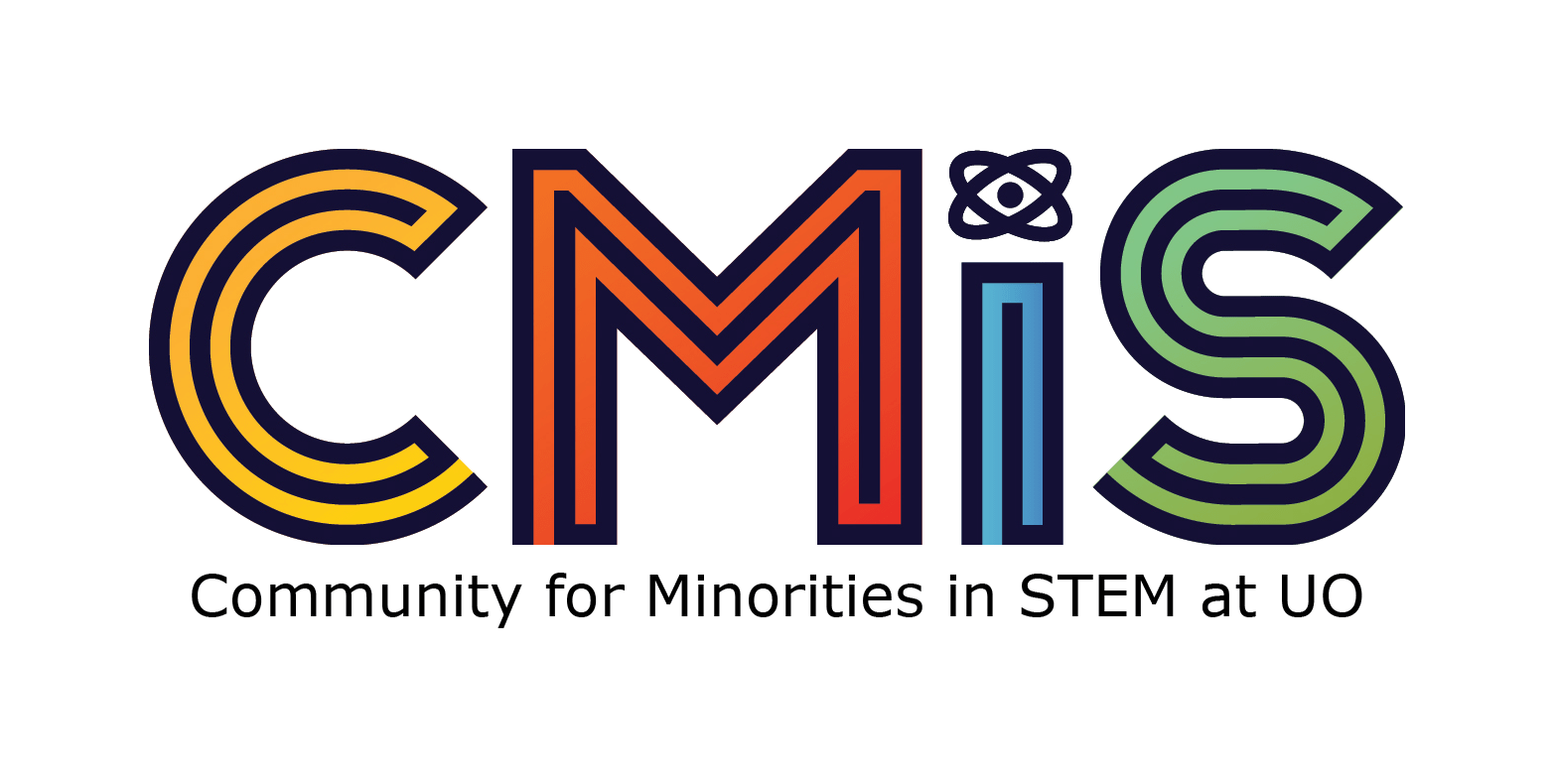Professional development opportunities are a critical part of fostering a supportive and inclusive community for ethnic and cultural minorities in STEM disciplines. CMiS is committed to financially supporting students’ participation at academic conferences, workshops, and other networking opportunities. CMiS offers two different travel awards to support distinct aspects of the CMiS Mission.
Excellence in Research Travel Award
This award helps students who identify as part of an underrepresented minority group engage with the academic community of their discipline.
Community Engagement Travel Award
This award emphasizes students’ engagement with efforts focused on diversity and inclusion in STEM fields.
Find more information on selection criteria, the review process and award policy here.
Previous Awardees
Winter 2024:
Aileen Fernandez (Anthropology)
Nicolette Molina – Crowell lab (Psychology)
Malvika Singhal – Hettiaratchi lab (Biochemistry, Knight Campus)
|
 Gabriel Luna-Arvizu – Grimes Lab (Biology, Institute of Molecular Biology) Gabriel Luna-Arvizu – Grimes Lab (Biology, Institute of Molecular Biology)
The CMiS travel award allowed me to participate and present my research at the 2023 SACNAS NDiSTEM conference in Portland, OR. My goal was to strengthen my career development skills. I met wonderful like-minded students presenting their research in STEM fields as well. Attending helped me build a network with professionals across disciplines, from biotechs and NGOs to government employees. I highly encourage people to apply for the travel award, which helped me cover registration and transportation costs. |
 Neeka Barooni – McCurdy Lab (Human Physiology) Neeka Barooni – McCurdy Lab (Human Physiology)
I study the developmental origins of health and disease and am interested in understanding how unfavorable intrauterine exposures reprogram fetal development to increase susceptibility to diabetes and cardiovascular disease. With the widespread implications of this research, I’ve been eager for the opportunity to discuss my findings and learn from other scientists. Thanks to support from the CMiS Travel Award, I was able to attend the 2023 Scientific Sessions of the American Diabetes Association last June. This was my first time attending a national research conference in-person, and I am incredibly grateful for the opportunities provided by this experience.
The Scientific Sessions brought together a diverse group of basic science researchers, translational scientists, clinicians, and healthcare advocates who share a common goal. I was able to exchange ideas and receive feedback from scientists with different personal and professional backgrounds. They introduced me to new experimental approaches and clinical perspectives that have since enhanced my dissertation work. In the days leading up to the conference, I got to participate in additional professional development opportunities through the ADA Scholars program. This included in-person lectures, career development workshops, and networking events that provided me with invaluable career guidance and a group of new friends from across the country. I am exceptionally grateful to have been awarded this opportunity to advance my professional growth and represent A Community for Minorities in STEM at the University of Oregon. |
 Sophie Miller (Anthropology) Sophie Miller (Anthropology)
The International Council for Archaeozoology Conference (ICAZ) is both an exceptional opportunity to present and network with specialists from all over the world, and incredibly expensive to attend as a student. Receiving the Excellence in Research Travel Award helped me to attend this international conference for the first time in nine years – an opportunity I will not be able to repeat until after I have finished my doctoral studies. In presenting my dissertation research to this community, I was able to introduce myself and organize future collaborations with several senior and mid-career professionals, as well as a tentative post-doctoral research connection. This was the first time I was able to share my work with any colleagues since being able to finally collect data post-lockdown, and I received thoughtful feedback on what I have been researching, which is currently being incorporated into my dissertation. I also volunteered to be a student representative on the executive board for ICAZ 2027; the conference organisers emphasised wanting to increase undergraduate, minority, and indigenous student involvement at the next meeting, and I want to hold them accountable to this pledge and help wherever possible. In addition to my own development, I mentored several first-year graduate students from a number of different universities who sought me out about effective conference networking, and how to make the most out of attending, advocating for themselves, and establishing future research connections. I thoroughly appreciate being able to help and teach newer students, as I still remember how intimidating it can be to attend your first international conference, especially without a lab or advisor present to support you. Attending this conference was an opportunity for me to develop my own career, to mentor and facilitate the careers of others, and to establish future actionable opportunities for me to advocate and support other underrepresented individuals in my field. |
 Victoria Olajide (Anthropology) Victoria Olajide (Anthropology)
Thanks to your support, I had the privilege of presenting my research at the 88th Society for American Archaeology Conference in Portland, Oregon. The presentation, titled “Human Agency and Theory in West Africa: Understanding Early Forest Agriculture Dynamics during the Neolithic,” aimed to shed light on the possibilities and challenges of modeling forest agriculture through diverse theoretical approaches. It underscored the critical role of human agency in the development and intensification of early socio-economic systems, particularly in the context of food production within the forest/savanna region. This research is not only of academic interest but by contributing to the dialogue surrounding West African archaeology, my work adds to the diverse perspectives shaping the field. This inclusivity is crucial for fostering a well-rounded understanding of our shared history and promotes West African history to the global audience within and outside of academia.
Once again, thank you for your support, which has been instrumental in advancing my research endeavors. I am truly grateful for the CMiS travel grant and the opportunities it has afforded me. |
 Rose Al-Saadi – Phillips Lab (Biology, Institute of Ecology and Evolution) Rose Al-Saadi – Phillips Lab (Biology, Institute of Ecology and Evolution)
The CMiS Excellence in Research Award supported my attendance at EVO-WIBO, a biennial conference for evolutionary biologists in the Pacific Northwest. This was my first time attending the meeting as it was canceled in previous years due to the COVID pandemic. The regional nature of this meeting, in contrast to larger conferences I’ve attended, provided a refreshing atmosphere that facilitated more meaningful connections with other graduate students and scientists. The highlight of the conference for me was the poster session—an exceptionally engaging experience compared to other conferences I’ve attended. The smaller scale allowed me to explore all the posters and have conversations with a few presenters whose work was relevant to mine. Attending EVO-WIBO proved to be an invaluable experience, offering opportunities to connect and network with local scientists. Establishing these meaningful connections has undoubtedly enriched my professional network and contributed to my overall growth in the field. |

 Gabriel Luna-Arvizu – Grimes Lab (Biology, Institute of Molecular Biology)
Gabriel Luna-Arvizu – Grimes Lab (Biology, Institute of Molecular Biology) Neeka Barooni – McCurdy Lab (Human Physiology)
Neeka Barooni – McCurdy Lab (Human Physiology) Sophie Miller (Anthropology)
Sophie Miller (Anthropology) Victoria Olajide (Anthropology)
Victoria Olajide (Anthropology) Rose Al-Saadi – Phillips Lab (Biology, Institute of Ecology and Evolution)
Rose Al-Saadi – Phillips Lab (Biology, Institute of Ecology and Evolution)